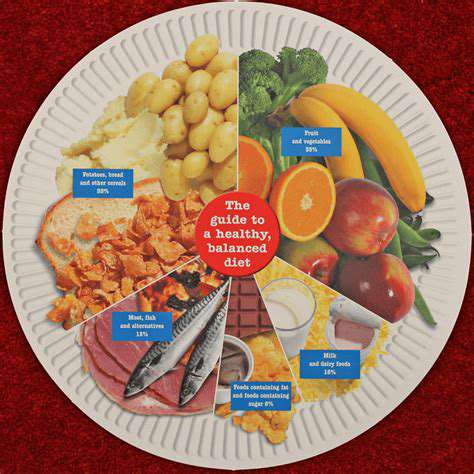A Comprehensive Guide to Achieving a Balanced Diet for Optimal Health
What is a Balanced Diet?

Understanding the Components of a Balanced Diet
A balanced diet is vital for maintaining overall health and well-being. It includes a variety of foods in the right proportions to provide all the necessary nutrients our bodies need. Key components of a balanced diet include carbohydrates, proteins, fats, vitamins, and minerals. Each component plays a crucial role in keeping the body functioning at its best.
Carbohydrates serve as the body's main energy source, fueling our daily activities and bodily functions. It is important to choose whole grains, fruits, and vegetables as they provide not just energy but also fiber, which aids digestion. Proteins are essential for growth and repair, as they help build and maintain tissues. Sources of protein include meat, fish, dairy products, legumes, and nuts.
Fats, contrary to popular belief, are a necessary part of a healthy diet when consumed in moderation. Healthy fats, such as those found in avocados, olive oil, and nuts, support cell function and the absorption of fat-soluble vitamins. Meanwhile, vitamins and minerals play various roles in immune function, energy production, and bone health.
In conclusion, a well-rounded diet consisting of a variety of foods can help individuals meet their nutrient requirements while also providing the energy needed for daily activities. Focusing on the right components in proper proportions will pave the way for better health.
Practical Tips for Achieving a Balanced Diet
Implementing a balanced diet does not have to be complicated. One effective strategy is to fill half your plate with fruits and vegetables, ensuring a colorful variety every meal. You can also plan your meals ahead of time to avoid impulsive and unhealthy food choices. This can help you maintain portion control and ensure all food groups are represented.
Another useful tip is to integrate whole grains into your meals. Choosing brown rice, quinoa, and whole grain bread will enhance fiber intake and keep you fuller for longer. Experimenting with different recipes can also make healthy eating more enjoyable and sustainable.
Reading food labels is crucial, as it helps you understand the nutritional content of what you're consuming. Look out for added sugars and sodium, aiming for options that are low in these ingredients. Incorporating healthy snacks, such as fruits, nuts, or yogurt, can also complement meals and prevent hunger between meals.
Ultimately, small, gradual changes in your eating habits can lead to long-term success in maintaining a balanced diet. Consulting a nutritionist or dietitian can provide personalized guidance tailored to individual health needs and preferences.
Key Components of a Balanced Diet

Macronutrients: The Building Blocks of Nutrition
Macronutrients include proteins, carbohydrates, and fats, each serving specific functions in the body. A well-rounded diet must contain a proper balance of these macronutrients to promote overall health. For example, proteins are essential for muscle repair and growth, while carbohydrates provide energy.
Fats, often misunderstood, are vital for absorbing certain vitamins and supporting cell function. Incorporating a variety of these macronutrients is crucial for maintaining energy levels and promoting bodily functions. It is important to choose healthy fats, such as those found in nuts and avocados, over saturated fats from processed foods.
When planning meals, consider the macronutrient ratios that work best for your individual needs, activity level, and health goals. By understanding the roles of each macronutrient, one can make informed dietary choices that enhance overall well-being.
Micronutrients: Essential Vitamins and Minerals
Micronutrients are vitamins and minerals that the body requires in smaller amounts but are crucial for optimal functioning. These nutrients play vital roles in processes such as immunity, bone health, and energy production. A deficiency in micronutrients can lead to serious health issues. For instance, vitamin D is necessary for bone health, while vitamin C supports the immune system.
Fruits and vegetables are excellent sources of various vitamins and minerals, and consuming a wide array of these foods can help ensure a balanced intake. Incorporating colorful produce into your diet not only adds visual appeal but also enhances nutrient diversity. It’s important to be mindful of the body’s need for these nutrients in order to prevent deficiencies.
For those who struggle to get enough micronutrients from food alone, supplements can be considered, but they should not replace a balanced diet. Consulting with a healthcare professional can provide personalized guidance on micronutrient needs based on factors like age, gender, and lifestyle.
Hydration: The Often Overlooked Component
Staying properly hydrated is essential for maintaining health and supporting bodily functions. Water is vital for digestion, temperature regulation, and nutrient transport. Despite its importance, many people underestimate the role of hydration in their overall diet.
In addition to drinking water, many foods, especially fruits and vegetables, contribute to overall hydration. Foods such as cucumbers, watermelon, and oranges are not only nutritious but also high in water content. Incorporating these hydrating foods can enhance your overall fluid intake.
Practical Tips for Implementing a Balanced Diet
Understanding Food Groups and Their Importance
To achieve a balanced diet, it's essential to understand the various food groups that provide the necessary nutrients. These include carbohydrates, proteins, fats, vitamins, and minerals. Each group plays a specific role in maintaining overall health and wellness.
Carbohydrates should form a significant portion of your diet, as they are the body's primary energy source. They can be found in foods like whole grains, fruits, and vegetables. Opting for complex carbohydrates can help ensure sustained energy levels throughout the day.
Proteins are crucial for the growth and repair of body tissues. Incorporating a variety of protein sources, such as lean meats, eggs, legumes, and dairy products, can help meet your body's needs effectively. For those following a vegetarian or vegan diet, focusing on plant-based proteins is equally important.
Healthy fats are vital for brain function and overall cell health. Foods such as avocados, nuts, seeds, and olive oil provide these essential fats. It’s important to distinguish between healthy fats and trans or saturated fats, which should be limited in a balanced diet.
Portion Control and Mindful Eating Techniques
Implementing portion control is key to avoiding overeating and maintaining a healthy weight. Understanding serving sizes can assist in keeping your calorie intake within a reasonable range. Measuring food and using smaller plates can help in managing portions effectively.
Practicing mindful eating enhances your relationship with food. This involves being aware of your hunger cues, eating slowly, and savoring each bite. By paying attention to what you're consuming, you may find it easier to recognize when you're full and stop eating.
Additionally, limit distractions during meals, such as watching TV or using your phone. This allows you to focus on your food and improve your sense of satisfaction with meals, reducing the chances of unnecessary snacking later.
Incorporating regular meal times into your daily schedule can also aid in portion control and mindful eating. Creating a routine helps your body establish hunger cues and can promote healthier food choices throughout the day.
Incorporating Variety for Nutritional Balance
A balanced diet should include a wide variety of foods from all food groups. This ensures that you receive a diverse range of nutrients necessary for optimal health. Different colors on your plate often indicate different types of nutrients, so aim to fill your plate with a rainbow of fruits and vegetables.
Experimenting with new recipes can also increase food variety. The internet offers countless resources for healthy cooking, which can make meal prep exciting and enjoyable. Consider trying a new type of grain, a different vegetable, or a unique flavor profile to keep meals interesting.
Shopping seasonally can also enhance dietary variety. Seasonal fruits and vegetables are often fresher, tastier, and more nutritious. Visiting local farmers' markets can provide inspiration and promote the consumption of locally sourced produce.
In addition, rotating your protein sources and fats helps ensure a balanced intake of essential nutrients. This not only supports overall health but can also prevent meal fatigue, ensuring you enjoy your healthy eating journey.
Overcoming Barriers to a Balanced Diet
Many individuals face barriers to maintaining a balanced diet, including busy schedules and lack of access to healthy foods. Meal planning can be an effective strategy to dismantle these obstacles. By preparing meals ahead of time, you can ensure that nutritious options are always available, saving both time and effort during hectic weeks.
Budget constraints can also pose a challenge; however, there are ways to eat healthy on a budget. Buying in bulk, choosing seasonal produce, and focusing on whole foods can help minimize costs while maximizing nutritional value.
Education is essential for overcoming barriers related to misinformation about nutrition. Engaging with reputable sources or consulting with a registered dietitian can clarify doubts and empower individuals to make informed dietary choices.
Lastly, fostering a supportive environment can contribute to success. Surrounding yourself with individuals who encourage healthy eating habits can positively influence your lifestyle choices. Sharing meals and cooking with family or friends can also create a sense of community around balanced eating.

